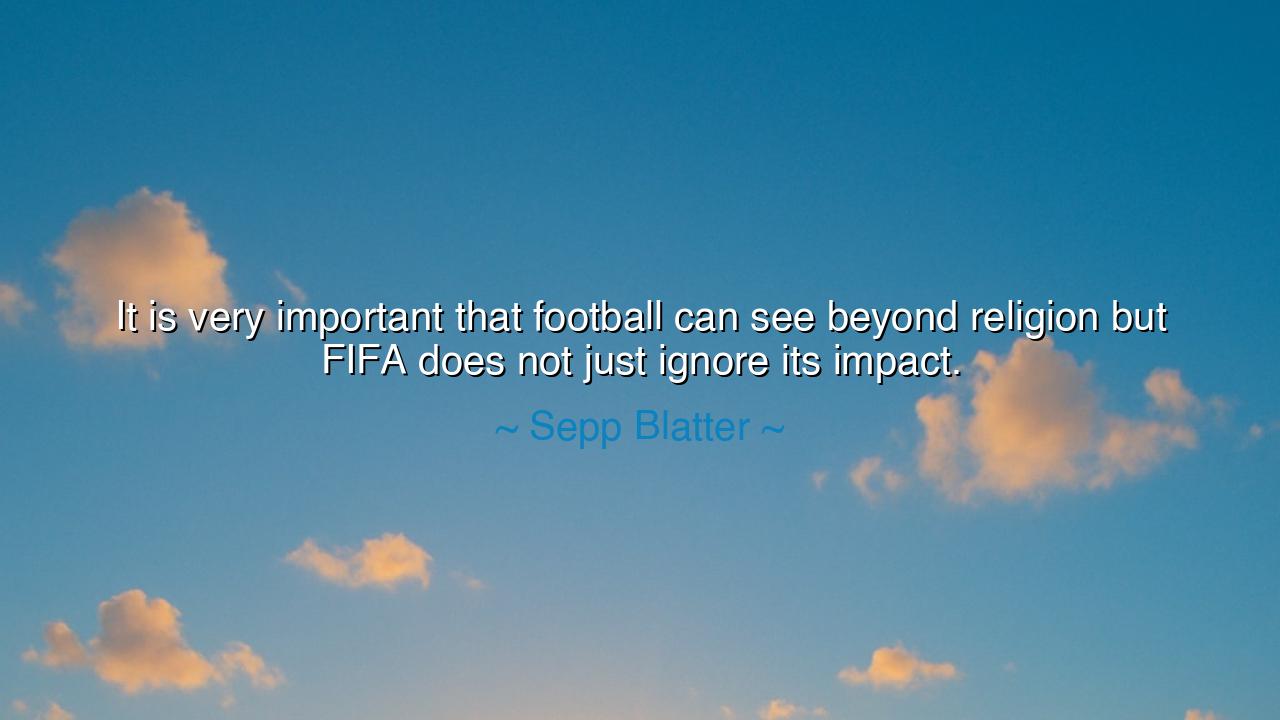
It is very important that football can see beyond religion but
It is very important that football can see beyond religion but FIFA does not just ignore its impact.






Sepp Blatter, speaking as steward of the world’s game, declared: “It is very important that football can see beyond religion but FIFA does not just ignore its impact.” In these words lies a wisdom greater than sport. He reveals that football, though played with feet upon the grass, moves in realms that touch the spirit. It is a game, yes, but also a mirror of humanity itself. It must rise above division, beyond creed, yet it must not blind itself to the mighty influence of religion, which has shaped peoples, nations, and identities since the dawn of time.
The ancients knew well the unifying and dividing power of games. In the Olympic festivals of Greece, city-states that often warred against one another laid down arms to honor Zeus, gathering in peace through sport. In these contests, religion and athletics were intertwined—the games were offered as sacred ritual, yet they also reminded humanity of its shared bonds. Blatter’s words echo this heritage: football must see beyond religion, binding the world in one fellowship, but it must also respect that belief shapes the lives of countless players and fans.
Consider a modern story that embodies this truth: when players in the World Cup kneel in prayer before or after a match. These moments are not about division, but about gratitude, about acknowledging the divine in victory and in loss. To some, these gestures are reminders of faith’s presence on the field. To others, they are acts of human authenticity. FIFA cannot ignore such expressions, for they show that religion still flows through the veins of the game, even as the game itself belongs to all, regardless of creed.
Yet history warns of another side. At times, religious difference has ignited conflict within the stadium. Rivalries have been inflamed not only by team colors but by sectarian lines. Clubs in places like Glasgow, where Catholic and Protestant tensions once spilled into football, show us the danger when religion and sport are used as weapons of division. Here, Blatter’s words are prophetic: football must “see beyond religion,” lifting itself above the flames of sectarianism, lest the field of joy be turned into a battlefield of hatred.
The meaning of the quote, then, is twofold. First, it proclaims that football is universal, belonging to no faith, to no doctrine, but to the human spirit itself. It is a game where Muslims, Christians, Hindus, Jews, and those of no faith at all may run side by side, bound not by creed but by the ball at their feet. Second, it affirms that religion cannot be ignored, for it is part of the lives of billions, shaping how they celebrate, how they compete, and how they express themselves. To erase it would be to erase part of humanity.
The lesson for us is clear: in our lives, as in football, we must learn to transcend division while still honoring difference. To “see beyond” is not to deny, but to rise above—to recognize that what unites us is stronger than what divides us, while still respecting the depth of what others hold sacred. This is not only the philosophy of sport, but the philosophy of peace.
Practical actions follow. In your own community, use sport, art, and fellowship as bridges across lines of faith. Respect the sacred practices of others, but do not let those differences harden into barriers. When you gather—whether on a pitch, in a workplace, or in friendship—remember that shared humanity is the greater team, and that to honor one another’s beliefs is not weakness but strength.
O seeker, carry Blatter’s wisdom: football must see beyond religion, yet never ignore its impact. So too must we all. Rise above division, respect the sacred, and remember that the truest victory is not scored in goals, but in the unity of humankind. For in this way, the game of life itself is made holy.






AAdministratorAdministrator
Welcome, honored guests. Please leave a comment, we will respond soon